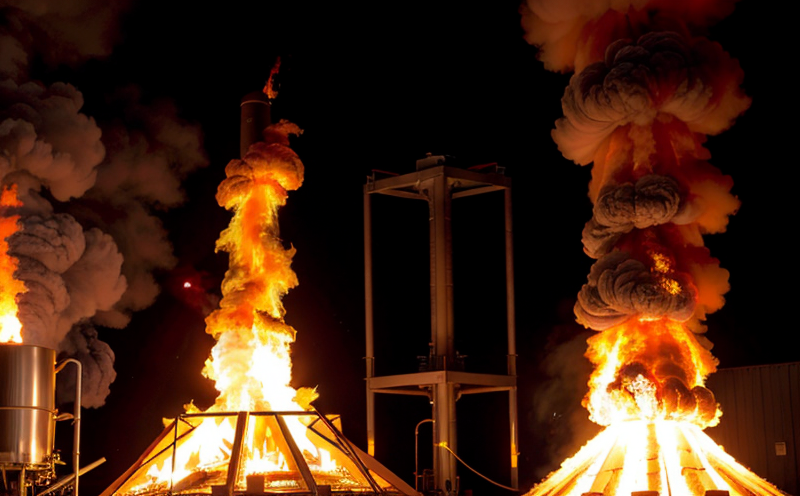ISO 11925 Flammability Testing of Building Materials
The ISO 11925 standard provides a method to determine the flammability properties of building materials when exposed to a specific heat source. This testing is crucial for ensuring that construction materials meet fire safety requirements, which are vital in preventing fires and reducing potential damage or casualties. The standard covers both the "smouldering" and "ignition" stages of combustion, providing a comprehensive evaluation.
The test procedure involves placing a specimen on a heat source, monitoring its response, and recording data according to specified criteria. Compliance with ISO 11925 ensures that materials are suitable for use in environments where fire safety is critical, such as residential buildings, commercial structures, and public spaces.
For accurate testing, the specimen preparation must follow strict guidelines provided by the standard. Specimens should be cut to precise dimensions and thicknesses, depending on their intended application. The choice of heat source (gas flame or electric heater) can vary based on the material type being tested, but consistency in testing conditions is essential for reliable results.
Instrumentation used during ISO 11925 testing includes thermocouples to measure temperature changes and cameras for visual documentation. Data collected from these instruments helps determine whether the specimen meets the specified criteria for smouldering ignition time or flame propagation index.
The acceptance criteria under ISO 11925 are designed to ensure that building materials do not pose an unreasonable fire hazard when exposed to a standard heat source. Compliance with this criterion is critical for ensuring public safety and meeting regulatory requirements in many jurisdictions.
- Smouldering Ignition Time: The time it takes for the specimen to ignite after being placed on the heat source.
- Flame Propagation Index: A numerical value indicating how rapidly flames spread across the surface of the material.
These parameters are essential in assessing the flammability characteristics of building materials and ensuring they meet safety standards. Proper execution of ISO 11925 testing requires expertise, precision, and adherence to all specified procedures.
In real-world applications, architects, engineers, and contractors rely on this test to select appropriate materials that will contribute to fire-resistant structures. By complying with ISO 11925, builders can ensure their projects meet stringent safety standards, thereby protecting occupants' lives and minimizing property damage risks.
Eurolab Advantages
At Eurolab, we offer comprehensive ISO 11925 flammability testing services tailored to the specific needs of the construction industry. Our laboratory is equipped with state-of-the-art facilities and experienced technicians who specialize in this field.
The advantages of choosing Eurolab for your ISO 11925 flammability testing include:
- Comprehensive Expertise: Our team has extensive experience conducting these tests across various material types, ensuring accurate and reliable results.
- Accurate Data Collection: We use advanced instrumentation to collect precise data during the testing process, providing detailed reports that meet your project requirements.
- Prompt Turnaround Time: Our efficient processes enable quick delivery of test results without compromising on quality or accuracy.
- Regulatory Compliance: By adhering strictly to international standards like ISO 11925, we ensure that all tests are conducted in accordance with current regulations and guidelines.
- Credibility and Reputation: Eurolab is renowned for its high-quality testing services and accurate results. Clients trust us to provide reliable data they can use confidently.
Our commitment to excellence, coupled with our deep understanding of the construction sector, makes Eurolab the premier choice for ISO 11925 flammability testing.
Quality and Reliability Assurance
At Eurolab, we prioritize quality and reliability in all aspects of our work. To ensure consistent accuracy in our ISO 11925 tests, we implement stringent quality control measures throughout the testing process:
- Calibration of Instruments: Regular calibration of thermocouples and other measuring devices ensures that all readings are accurate.
- Standard Operating Procedures (SOPs): We follow strict SOPs to maintain uniformity in specimen preparation and testing procedures.
- Data Verification: Multiple checks are performed on the collected data to verify its accuracy before final reporting.
- Trained Personnel: Our technicians undergo continuous training to stay updated with the latest techniques and standards.
These measures guarantee that every test conducted at Eurolab meets the highest quality standards, providing clients with confidence in their results. Our unwavering dedication to excellence ensures that you receive reliable data you can trust for making informed decisions about your projects.
Competitive Advantage and Market Impact
Choosing Eurolab for ISO 11925 flammability testing offers significant competitive advantages in the construction industry. Here's why:
Reputation: With a proven track record of delivering accurate, reliable results, Eurolab enjoys a strong reputation among clients and industry peers.
Speed: Our efficient processes mean faster turnaround times without sacrificing quality or accuracy.
Compliance: By adhering strictly to international standards, we ensure that your tests meet regulatory requirements, helping you avoid delays due to non-compliance issues.
Risk Management: Knowing that your materials have been tested according to ISO 11925 reduces the risk of fire incidents and potential legal liabilities.
Cost Efficiency: While maintaining high standards, our competitive pricing model helps you manage costs effectively without compromising on quality.
In today's competitive market, these advantages can make a substantial difference. Eurolab not only supports your compliance efforts but also enhances your reputation and market position by demonstrating your commitment to safety and quality in construction materials.





